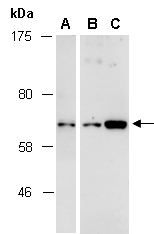Abiocode Logo
Products
Contact Us
- Telephone:
1-818-707-0309 - E-Mail:
Abiocode@Abiocode.com
R1231-2 - PAK1 (N2) Antibody, Rabbit Polyclonal
|
Quantity: 100 ul Application: WB Predicted | Observed MW: 61 I 70 kDa Uniprot ID: Q13153 Background: p21-activated kinase 1 (PAK1) belongs to the protein kinase superfamily, STE Ser/Thr protein kinase family and STE20 subfamily. PAK1 can be activated by CDC42 and RAC1, and is likely the GTPase effector that links the Rho-related GTPases to the JNK MAP kinase pathway. PAK1 is involved in the dissolution of stress fibers and reorganization of focal complexes, as well as in the regulation of microtubule biogenesis through phosphorylation of TBCB. DVL1 and PAK1 form a ternary complex with MUSK which is important for MUSK-dependent regulation of AChR clustering during the formation of the neuromuscular junction (NMJ). The activity of PAK1 is inhibited in cells undergoing apoptosis, potentially due to binding of CDC2L1 and CDC2L2. Serine/threonine-protein kinase PAK 1, Alpha-PAK, p21-activated kinase 1, PAK-1, p65-PAK Source and Purity: Rabbit polyclonal antibodies were produced by immunizing animals with a GST-fusion protein containing the N-terminal region of human PAK1. Antibodies were purified by affinity purification using immunogen. Storage Buffer and Condition: Supplied in 1 x PBS (pH 7.4), 100 ug/ml BSA, 40% Glycerol, 0.01% NaN3. Store at -20 °C. Stable for 6 months from date of receipt. Species Specificity: Human, Mouse Tested Applications: WB: 1:500-1:2,000 (detect endogenous protein*) *: The apparent protein size on WB may be different from the calculated M.W. due to modifications. Product Data:
(A) human HeLa; (B) mouse thymus; (C) mouse brain; using anti-PAK1 (N2) (R1231-2) at RT for 2 h. |
